3 Volumes
Culture: The Flavors of Philadelphia Life
Philadelphia began as a religious colony, a utopia if you will. But all religions were welcome, so Quakerism mainly persists in its effects on others, both locally and in America, in Art, clubs, and the way of life.
Sociology: Philadelphia and the Quaker Colonies
The early Philadelphia had many faces, its people were varied and interesting; its history turbulent and of lasting importance.
A New Era in Politics: Clinton, Obama, and Trump
New forms of communication made the party system largely obsolete.
Theatre in Philadelphia
Theater has declined, everywhere in the western world. But in Philadelphia, even today if you attended every new play you would keep pretty busy.
Fanny Kemble
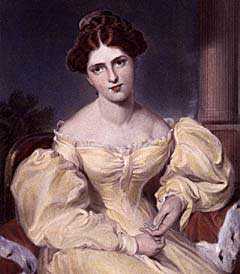
|
| Fanny Kemble (Sully) |
Frances Anne Kemble, universally known as Fanny, was just about the most magnificent Philadelphia woman of the Nineteenth Century. She spent much of her time abroad and others claimed her, but she was ours. Coming from a famous English theater family, the niece of Mrs. Siddons and the daughter of the founder of Covent Gardens, she quickly rescued the failing family fortunes by becoming the most striking Shakespearean ingenue of the time. It took very little time for her to know Lord Byron, Thackeray, and various other luminaries of the literary and artistic world of Europe, along with Queen Victoria. One might as well say she knew everybody unless one made the point that everyone knew her.
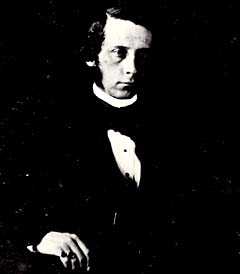
|
| Pierce Butler |
On a theatrical grand tour of America she met and married the Philadelphian Pierce Butler, one of the richest bachelors in the nation, heir to huge estates in Georgia. She had plenty of other choices, including the most dashing and romantic devil of the century, Trelawny. That glamorous friend of Byron's had been the one to drag Percy Shelley's body from the ocean, and was surely the greatest heartthrob of the century. Toward the end of her life, Fanny demonstrated the range of her appeal by totally subjugating the intellectual novelist Henry James, who was 34 years younger than she was. Her portraits by Sully now hang in the Pennsylvania Academy of the Fine Arts and in the Rosenbach Museum. Although Sully was said to have glamorized her a bit, her movie star qualities are evident. But appearance alone could not have mesmerized Henry James, known in literary circles as The Master. She was evidently one of those powerfully self-assured personalities encountered from time to time, who dominates every conversation, fills every room she enters, inspiring admiration rather than jealousy. As a youth, she was enchanting, as a mature woman, magnificent. Henry James described her as having "an incomparable abundance of being."
But this was not just another Cleopatra. Fanny Kemble had two personal achievements of enduring note. Because of health limitations, she went beyond being a Shakespearean actress to inventing a style of a public reading of Shakespeare, taking all the parts herself. She and Dr. Samuel Johnson were the two successive forces transforming Shakespeare's reputation from the quaint playwright of the past into the permanent towering figure of the English language.
Her other achievement destroyed her private life. As the wife of the owner of a thousand slaves, she led the attack on slavery before the Civil War. During the War, her passionate defense of emancipation was the main factor in persuading the British Government to refuse badly needed loans to the Confederacy. However, the publication of her journals was the last straw in a tumultuous marriage, and Pierce Butler divorced her, taking custody of their daughters, exiling her to England. Southern plantation owners were always short of cash, and realistically one has to acknowledge the strain of demanding to emancipate a thousand slaves, each one worth a thousand dollars. In one of the supreme ironies of a tragic situation, the forced sale of the slaves compelled the Butlers to liquidate an asset just before it was going to be destroyed by wartime events. Butler died in 1863, but she had done him a financial favor.
Fanny's daughter married Dr. Caspar Wistar, of Grumblethorpe and the grounds of present LaSalle College. Her grandson was Owen Wister, the college roommate of Teddy Roosevelt, later the author of The Virginian. Famous for the phrase "If you say that to me, smile", Owen Wister and his roommate created the fable of the romantic cowboy which still dominates movies and fiction, and, from time to time, the Presidency of the United States.
Swashbuckler
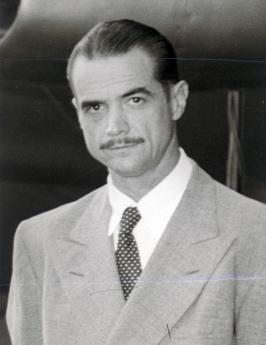
|
| Howard Hughes |
In 1947, Howard Hughes was summoned to Washington to testify at a Senate hearing. Claude Pepper, Democrat of Florida, was in the chair, clearly angry about Hughes' conduct of munitions contracts, including flagrant non-performance. Three wooden flying boats had been commissioned for $18 million but not produced, people had been killed in crashes of test planes, and the newspapers were full of obscure allusions to unspecified wrong-doing in high places. Although the Hughes hearings were front page news for weeks, in those days it was only necessary to walk in and sit down if you wanted to watch them.
Under the circumstances, it would have been understandable if Hughes had been reduced to a trembling mumbler, probably advised to "take" the Fifth Amendment with every question. Congressional chairmen, particularly Claude Pepper,
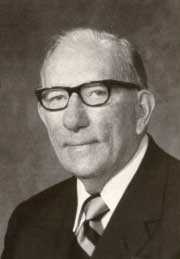
|
| Claude Pepper |
quite regularly grandstand and bully the helpless witness at hearings like this, since it portrays them to the voters as heroic defenders of the public interest, and could even forward their chances of becoming a Presidential candidate. Hughes the scapegoat seemed to be in for a public flogging. The first step was to haul him before the committee and then keep him waiting for an hour or so, while the members attended to important public business, maybe even had to go for a roll-call vote or something. You could tell that things were not going according to the usual script when Hughes himself arrived quite late, accompanied by quite a large staff or retainers. When Pepper still delayed the hearing, Hughes called for a newspaper and elaborately read the comic pages.
The Texas swashbuckler didn't look the part. His accent and tailoring reflected a New England boarding school, and while his mustache resembled that of his friend Errol Flynn, he had a voice like a lion and lightning retorts that would do credit to Bill Buckley. Reminding the Chairman that he had been deafened in the crash of a racing plane, he asked him to repeat the question. Sorry, please repeat it again. And again, and again. Pepper was beside himself.

|
| The Spruce Goose |
Flustered, Pepper tried to reverse the treatment. Senator, I have already answered that question. Well, answer it again. No, I stand on my previous testimony. I forget what you said. Have the stenographer read it to you. Her transcript is not complete. Very well, my own secretary will read it back to you.

|
| Glomar Explorer |
As if to demonstrate that he hadn't defrauded the government, Hughes, who always test-piloted his own planes, flew the H-4 about a mile in less than a minute during what was supposed to be a taxiing test on November 2, two months after his congressional testimony.
In another strange and unexplained footnote, the Glomar Explorer was a ship built in Philadelphia and used in Project Jennifer in an attempt to salvage a sunken Russian nuclear submarine and discover any secret technology it might contain. This was long past the time when Hughes was supposed to be disgraced and banished from Government contracts. The Senate hearings obviously had no effect on his status, and indeed might even have been entirely staged to mislead the Russians and others. Like so many things in his life, this episode has no readily obvious explanation.
Only in retrospect is it possible to see that Hughes was involved in lots of top-secret matters, and the bravado of his defiance -- not to say contempt of Congress -- might have had roots in some sure knowledge Pepper would not dare touch him. The CIA commissioned him to build the Glomar Explorer to find a sunken Russian submarine, using a phony story of manganese recovery. The supposed political victim of the much later Watergate break-in, Larry O'Brien, is said to have once been a Hughes employee; on the other hand, Hughes was very close to the Nixon Administration. There were inevitably many ties between his Las Vegas gambling empire and Cuban underworld figures, as well as Hollywood figures. Hughes was an owner of the Dallas movie theater where John Kennedy's murderer Lee Oswald tried to hide and was captured. It is not possible to judge Howard Hughes by the usual standards; this eccentric billionaire was capable of doing unimaginable things and it will be remarkable if spectacular news about him ends with his death.
Show Biz Image: Hepburn, Rogers, Kelly
A fair lady's image depends, Bernard Shaw told us, not on how she acts, but on how she is treated. The case in point is a beautiful Main Line heiress in The Philadelphia Story, who can choose any man she wants. What she cannot do, is escape grief for a wrong choice.
When Broadway and Hollywood paint your image, not believing your own press releases takes strength. Toward the end of the Great Depression around 1938, show business turned full and nasty attention to Philadelphia high society. Earlier, while author Christopher Morley was at Haverford College, Katharine Hepburn at Bryn Mawr College, and Grace Kelly at school on Schoolhouse Lane, Hollywood had picked up just enough authentic detail to be dangerous. Kitty Foyle and The Philadelphia Story are two fairly accurate snapshots of a complex society, but one cannot be fully understood without the other. Indeed, the real-life trivialities of Howard Hughes, Katharine Hepburn, Grace Kelly, and Ginger Rogers sharpen the outlines of the graceful gentlefolk they attempted to portray.
In 1938, Hepburn was a smash hit on Broadway with Philip Barry's Philadelphia Story, which essentially tells of the agonized turmoil of a Main Line princess, facing a three-way choice between a charming but worthless blue-blood, a self-made dullard, and a poor but noble New York magazine writer. (Just guess who the author was rooting for.) In real life, of course, Ms. Hepburn chose to spend four years with movie producer Howard Hughes the dare-devil Texan with a hundred starlets in his bedroom. Most of her competitors wanted a movie contract and/or a diamond bracelet, but Katy wanted the movie rights for Philadelphia Story, which Howard readily bought for her. Although other actresses played the role, she made herself into the image of a Philadelphia heiress, thereby nudging that Main Line image toward her own. At the time the image did not include much mention of Howard Hughes or actor Spencer Tracy, another long-time companion.
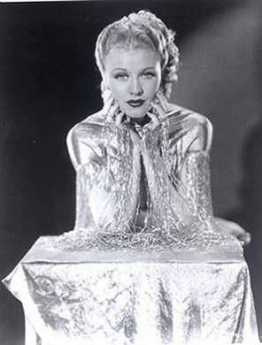
|
| Ginger Rogers |
Meanwhile, Ginger Rogers, who was also engaged to Howard Hughes at one point, was making a great name for herself as the star of Christopher Morley's Kitty Foyle. Morley's Haverford experience taught him somewhat more respect for the Philadelphia Gentleman than Barry ever had, while his experience at the Curtis Publishing Company also made him appreciate the smart and plain-spoken Philadelphia girls from working-class districts. Highborn Philadelphia women are only sketchily imagined by Morley, except they somehow fail to appeal to his manly fictional cricket-player from the Main Line.
As matters turned out, Katy lost to Kitty. Although Hepburn was surely the more talented actress, eventually winning five Academy Awards, Ginger Rogers walked away with the 1940 Oscar for her interpretation of a working-class Philadelphia lady. Either way it turned out, of course, Howard Hughes was bound to be a happy fellow.
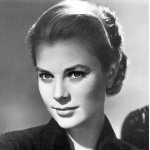
|
| Grace Kelly |
And yes, in 1956 Grace Kelly was the star of High Society, a renamed version of the Philadelphia Story for which, remember, Katherine Hepburn still controlled the rights. The film was a mediocre performance, just a little short of embarrassing. But however inexact all three of these portrayals may have been, there is little doubt that Philadelphia society moved a bit in their direction, involuntarily living up to an image created by three observers who seemed to their own observers to retain hostility traceable to their own undefined turmoils.
Philip Barry stacks the deck somewhat, portraying the leading lady as movie audiences during the Depression were likely to fantasize, indulging a luxury only a rich girl would supposedly be careless about. She rejects the colorless rich suitor out of hand. But while her remaining choice between a charming magazine writer and a charming playboy is made to seem a closer call, it really never makes our Philadelphia Cleopatra hesitate very long. In the single editorial comment, the play's author permits himself, is tucked the snarl, "She's a lifelong spinster, no matter how many times married." That's New York talking. Bitter, bitter.
REFERENCES
| Philadelphia Gentlemen: The Making of a National Upper Class: E. Digby Baltzell ISBN-13: 978-0887387890 | Amazon |
Falstaff Without Prince Hal
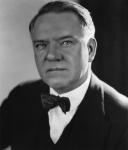
|
| W. C. Fields |
William Claude Dukenfield was born in Philadelphia in 1880, the eldest of five children of Cockney immigrant parents. He spent four years in school, was roundly abused by his parents, and left home at the age of 11 after being hit on the head with a shovel. During a self-taught adolescence, W.C. Fields slept in jail many times but learned to be such an accomplished pool player and juggler that he became the toast of Vaudeville. When silent movies made their appearance, he was successful in a second career, and then again when talkies came along. He was one of the ten or twenty most famous actors of the golden age of motion pictures, and, following the legend of the Great Depression, lived in a Hollywood mansion in great style.
Although he was a great natural comic, and had a sharp piercing wit, the image he was destined to project was that of the great alcoholic reprobate, during the period of national Prohibition. It was wicked that he was so lovable with his unashamed praise of gin martinis. And, of course, his outrageous defiance was a very thinly disguised symbolism of the growing public feeling that perhaps the Volstead Act had been a mistake.
It has not been made clear whether his repeated insults aimed at Philadelphia were fundamentally bitter or fundamentally just rough expressions of affection for a home town that never welcomed him. He constantly insulted just about everything and everybody. If it was a bitter war, he probably won it. His jibes and caricatures of the hometown have endured, long after his death in 1946.
"I once spent a year in Philadelphia. I think it was on a Sunday."
" I can love almost anything, except children and small dogs."
Hangman: "Any last words?" W.C.: "Yes, I'd like to see Paris before I die. (Pause) Philadelphia will do."
His famous recommendation for an epitaph: " On the whole, I'd rather be in Philadelphia."
Friends of Boyd
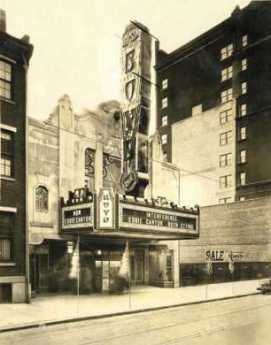
|
| Boyd Theatre |
Howard B. Haas a lawyer, and Shawn Evans an architect, are captains of a team trying to "save" the old Boyd Theatre at 1908 Chestnut Street. Since Clear Channel, the present owner has invested $13million in the property, and the preservationists agree that renovation of the movie palace to all its former glory would cost between $20million and $30million more, it's easy to understand why every other movie palace in central Philadelphia has been demolished. Furthermore, that area of town is having a resurgence of high-rise construction, so one use of the property must be balanced against others.
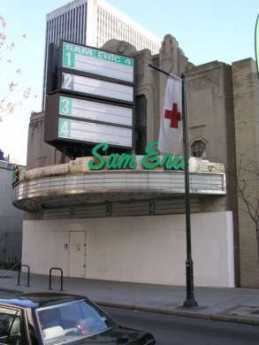
|
| Sam Eric |
The Boyd was built in 1928, just before the stock market crash, and closed in 2002. In fact, it changed its name to SamEric in its dying days, but the public remembers it as the Boyd, one of ten movie palaces in center city. The definition of a "palace" is arbitrary but is generally taken to be a theater with more than a thousand seats, normally with hyperbolic architecture to fit its hyperbolic advertising. Scholars of the matter say the earliest movie houses were constructed in Egyptian style, soon evolving into French Art Deco. Ornate, whatever it's called.
The palace concept developed in the era of silent films, with subtitles. Anyone who has experimented with home movies knows that the silent film sort of lacks something, particularly between reels and at times of breakdown in the projection. That's why brass bands played on the sidewalk outside, pipe organs played during intermissions, and all manner of vaudeville appeared on stage. Sound movies, or talkies, were immediately much more popular when they appeared in 1927, and had less need of the window dressing from other distractions which had grown into a moviehouse tradition which was slow to die.
The movie studios owned the films and soon built theaters to display them. The movie business was quite profitable from the start, so studios had the necessary finance to spread a network of very large theaters across the country quickly. The ability to concentrate hyped-up advertising with immediate display of the product in large captive theaters tended to drive the model of the "palace", which was able to sustain higher ticket prices than trickling a larger number of film copies to myriads of small "mom and pop" local theaters. In very short order, going downtown to see movies became at one time the largest reason for suburbanites to go to the center of town on public transportation, fitting in nicely with the concentration of huge department stores, also located there. Restaurants, bars, bowling alleys, and shops grew up to address the crowds. Furthermore, the economic depression of the 1930s slowed down what was to become a relentless automobile-flight to the suburbs. After the spread of free television at home in 1950, the downtown movie palaces were doomed. The legal profession helped, too. Small suburban theater operators eventually won an antitrust suit against what they described as monopoly power of studio-owned center city palaces, so a host of small sharks in the suburbs started to eat the whales downtown. Furthermore, the sound quality was easier to achieve in a smaller auditorium. To tell the truth, fire hazard was also lessened without the arc-lamps needed to project images across a long distance.
So, a new technology interacting with an old theatrical tradition quickly created the movie industry in its downtown movie palace form; more advancing technology quickly destroyed it, with a little help from economics and politics. Good luck to the friends of this historical epoch, who have a monumental task ahead to work up the public nostalgia and political strength required to overcome a huge economic obstacle of the "highest, best use of the land". In many ways, the most valuable contribution of this movie palace restoration movement is to dramatize in the public mind just how urban centers function. Department stores are gone, going in town to the movies is over. How else are you now going to get the couch potatoes to go downtown voluntarily, and often? Just imagine ten palaces simultaneously filling up with several thousand suburbanites apiece, seven nights a week. Without those additional drawbacks on ample display in Atlantic City and Las Vegas, please.
WWW.Philadelphia-Reflections.com/blog/1190.htm
Valentine Tours, Right Here in River City
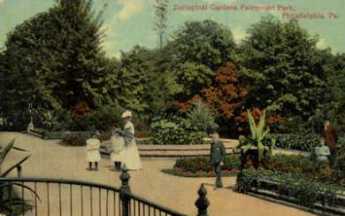
|
| Zoo Opening |
The Philadelphia Zoo claims to be the oldest zoo in America, although New York's Central Park Zoo is older. The explanation for this puzzle is that the Philadelphia Zoo was chartered by the legislature in 1859, but its opening was delayed by the Civil War until 1874. Meanwhile, the Central Park Zoo was opened in 1862. One hopes the true priorities are perfectly clear, although the Romans had zoos, and Montezuma had a spectacularly big one when Cortes arrived. Why all this wandering prologue before a discussion of a Valentine Tour? Well, since the internet is so plagued by a dispute about what is suitable for children to read, it is not clear that our Zoo's legitimate activities would escape hostile robot detection, banishment by Google, or the like if we talk about them on this website. So we will be indirect.
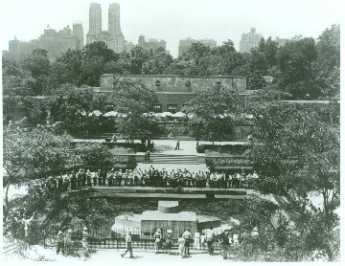
|
| Central Park NYC |
It is related that it was the women's committee of the zoo who first proposed an adult zoo camp which now goes by the name of Valentine Tours. For a modest fee of $75, it is possible to join this activity, involving discussions and demonstrations of the varieties and complexities of vertebrate reproduction. It is not only the Philadelphia public which needs education in these matters. One of the main sources of infertility among rhinos and gorillas derives from the surprising fact that they must be taught what to do. Apparently, when removed from the voyeur opportunities of their native environment, these monsters can't figure out what is expected of them.
John Bernard, a docent at the zoo for 18 years, has written a book about the varieties of romantic experiences and recently addressed the Right Angle Club on the matter. He tells of four-footers and hundred-pounders, and the like. Apparently, male elephants make their ladies wait in line for their turn, male gorillas have several girlfriends at all times, and male lions are so occupied with demands made on them that they scarcely do anything else. Bats cavort upside down, eagles lock claws and fall out of the sky, polar bears starve for months afterward. The fascination just goes on and on.
The inside details of some recent events are also revealed. Male African elephants go into a variant of heat that lasts three months and makes them dangerous to be around. That's really why the zoo recently decided to get rid of its elephant collection. Orangutans will rape a female zoo employee if given a chance. The Women's Committee of the Zoo is certainly to be thanked for alerting us. For more details, stump up the $75 and take a Valentine Tour.
Neglection
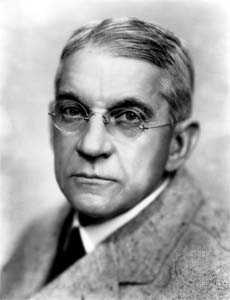
|
| William Lyon Phelps |
Billy Phelps, that's William Lyon Phelps, once remarked he had watched a performance of every single Shakepeare play, except two. That put the idea in my young impressionable head, and eventually, my wife and I watched a performance of every single one of those plays. Some of these blur in my recollection, a little. And although watching those thirty-six performances was a great overall experience, I would have to say that about fifteen of them seemed very poor. It's particularly vexing that several of the bad plays were written after most of the divinely wonderful ones, so their poor quality can't be blamed on inexperience, and the whole thing is a little hard to explain.
Indeed, if you did nothing but read the plays, you would think many more of them are of poor quality. But in the hands of a clever director, the bloody plays like Titus Andronicusare extremely effective; one easily sees why Elizabethan audiences flocked to see the melodrama. That's also true of the scenes of shipwrecks and storms , as seen in The Tempest and ,Pericles, or on land in King Lear. And the silly little comedies, with ladies in disguise or twins confused, are delightful little jigs on the stage when you actually see them performed. The experience leads to the question whether some of the other plays are not poor at all, just misunderstood.
After sixty years of intense devotion to a scientific specialty, the Shakespere Society of Philadelphia created a refuge to return to. After long sensing that scientific colleagues regarded attendance at thirty-six plays as a strange quirk, there was a group which regarded it as an achievement to be respected. A group which understood that the only times Shakespeare signed his own name, he spelled it, Shakespeare. And who took seriously the idea that some of the inferior plays in the canon might well have been written, wholly or in part, by some other person.
It thus happens that this group, after fifty years of avoiding it, was restudying Pericles. The tradition has been that this secondary play was written about the same time as King Lear, although it is hard to believe. Eminent scholars regard the first two acts as having been written by someone else, while the last three acts were written by Shakespeare, but this group thought it questionable that any of Pericles measured up to standard. The speeches are choppy, the plot jumps all about, the characters seem unreal. And then we come to neglection. As in the speech by
The Man Behind the Mann
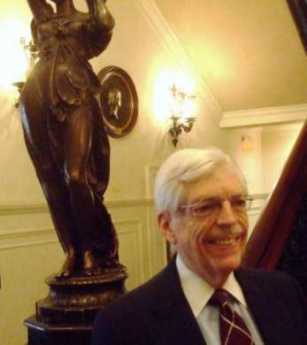
|
| William Leonard |
William Leonard, a distinguished lawyer retired from the distinguished firm of Schnader, Harrison Segal and Lewis addressed the Right Angle Club recently about his adventures running the new and improved Mann Center in Fairmount Park. A member of the board, he was suddenly asked to act as interim CEO when Peter Lane went on to another career. His task was to hold the organization together, while a permanent replacement was recruited. It turned out that directing an organization and actually running it are two entirely different things. It was necessary to learn about show business programming, the problems of rock groups, the whims of donors, the headaches associated with food vendors, and lease renewals with city governments, not to mention the rigidities of state and federal rules. Leonard obviously enjoyed the challenge, although most of us wouldn't.
The Philadelphia Orchestra had been playing summer concerts in the park since 1930, eventually adopting the name of Robin Hood Dell, East. Although the city contributed a couple hundred thousand dollars of support, and several hundred thousand other dollars came from non-ticket sales, classical music was always a long way from breaking even. The big revenue came from Rock Concerts, which may have been humiliating for the classical musicians of international fame, but was nevertheless what it took to survive, take it or leave it. Fred Mann in 1976 took the lead in raising funds for a roofed outdoor performance center, and the enormous energy of Peter Lane was brought from the New York Pops to get things going. In ten years, the Mann Center increased its outside support to $2.8 million of the $8 million annual budget and was putting on forty performances a season, with attendance increasing by 20% from 2006 to 2007. All this was accomplished in spite of the city government dropping its contribution to zero, and dropping music courses in the school system.
In a sense, the city stringencies may have been a blessing for the Mann. A second capital campaign raised $15 million for expanded facilities and parking, as well as an education center, to meet the new community need. A complimentary ticket program distributes 50,000 free tickets yearly, and seats on the lawn cost $10. If you want to get under the roof, it costs more. The free program familiarized parents with the program, and the educational center is now thriving.
Mr. Leonard brought along the new CEO, Cathy Cahill, and it looks as though he made a good choice. She's only been here for 19 days, but she went to Temple and Drexel before taking jobs out of town. She's a cellist herself, which should ease labor relations somewhat, although the pep and enthusiasm are surely innate. We hear that SEPTA is planning to re-open the R-5 station, and jitney bus service for the whole Park complex will be shared with the Please Touch Museum and other new activities in the 1876 exhibition area. There are plans for a Shakespeare repertory group to have a home here. This drive and enthusiasm are going to be necessary because Rock Groups are now competing in the Wachovia Center, and the Tweeter Center in Camden. Apparently, the secret of classical music finances leaked out.
www.Philadelphia-Reflections.com/blog/1479.htm
Plays and Players, Haddonfield Version
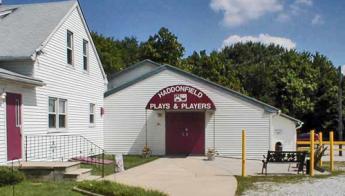
|
| Haddonfield Plays and Players |
First, an anecdote from my own lurid past. When I went there, Yale was an all-male institution with one exception, the Drama School. It's true that Shakspere had boys play the part of women in his plays, but Yale evidently felt that was going unnecessarily far, and had thus let the nose of the female camel get under the all-male tent. Meanwhile, I had discovered that a course in Advanced Chemical Engineering was carrying my amateur interest in chemistry sets a long way too far, and after two weeks, I wanted out of it. Out!
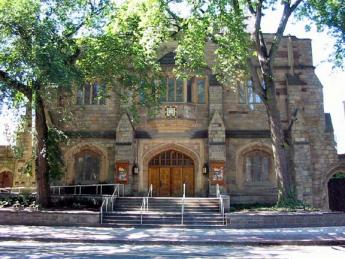
|
| Yale Drama School |
The Dean was sympathetic until I answered what I wanted to transfer into -- a course at the Drama School. Somehow, he felt that was immensely amusing, one he hadn't heard before. But, finding my grade average satisfactory, he gave a big wink and signed the paper. I didn't pretend to be offended, but I did pretend to be solemn. The experience subsequently served me very well, since that class of girls went down to Broadway at the same time I went down to New York to medical school. Almost none of my mostly all-male class of medical students knew any girls in New York, but by comparison, I knew lots. It made me very popular with both groups.
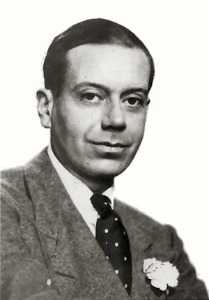
|
| Cole Porter |
It thus develops that I had the courage recently to accompany to a theater party in Haddonfield, a lady who had spent twenty-five years on the stage. The play was Cole Porter's Anything Goes, put on by the Haddonfield Plays and Players, a group celebrating its 75th year of productions. You seldom see musical comedies anymore, because the large cast and orchestra requirements are pushed by Union rules to the huge expense which a professional group cannot safely risk, and amateur groups mostly cannot enlist a large enough audience to support. In addition to the orchestra, stagehands, and administration, I counted thirty members of the cast up on the stage for the big chorus numbers. There might have been a hundred in the audience to pay the bills. This wasn't the only play of the season, there will be five I understand, so the performers have to be quick studies, which generally means considerable experience. Even with what therefore must have been a short time to rehearse, this group was good, really, really good. The lady by my side remarked these people must be semi-professionals, at least. I didn't think so, so she demanded a playbill to see. Sure enough, semi-pro.
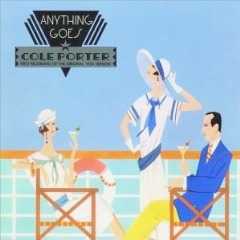
|
| Anything Goes |
All of which may seem a round-about way to get to an observation about the current theater revival in Philadelphia. There are at least fifty new amateur theater groups scattered throughout our region, filled with "kids" having a wonderful time playing Shakspere, Albee, Shaw and whatever. At cast parties, almost none of them expresses any interest in going to Broadway or Hollywood; they are mostly software engineers or similar. Since the Philadelphia revival of interest in performing arts is so striking, it has led to ruminations about why the theater similarly flowered in Elizabethan London, at a time when there were only two theaters in Paris, by comparison. Perhaps this parallel has something to teach us about the hidden social impact of Sir Thomas Gresham and dual coinage, or Sir Francis Drake and the Armada.
But maybe, I realize for the first time, there is a flight in our direction, from New York City.
Cushman Club for Lonesome Actresses
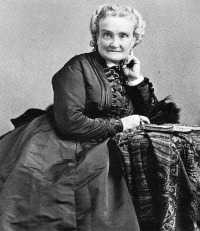 |
| Charolotte Cushman |
Lydia Ellicott Morris was married to another member of the Quaker colonial aristocracy, George Spencer Morris; both of them were active members of many organizations, including the Philadelphia Savings Fund Society, Friends Hospital, and several of the clubs on Camac Street. Their home for many years was located at 225 South Eighth Street. George Morris was a senior partner of Morris and Erskine, Architects. One day, Lydia was riding on a trolley car.
On the trolley, she overheard two young actresses fretting over the problem that traveling actresses were forced to live in hotels and boarding houses along with traveling salesmen. This circumstance forced them to experience much-unwanted attention and made being an actress a difficult occupation for respectable women. Lydia promptly got off the trolley and formed an organization raising funds to create in 1907 a boarding home to provide safe, respectable, inexpensive lodgings for actresses in traveling shows, playing in Philadelphia. It was named after Charlotte Cushman, the first internationally famous American actress, and located at 1010 Spruce Street. Charlotte Cushman had no connection with the club, but her fame can be appreciated from the fact that in 1874 after her final performance, 15,000 people were reported to have serenaded her outside of New York's Fifth Avenue Hotel. The Ninth Regimental Band played, while fireworks illuminated Madison Square. Ms. Cushman died in 1876.
Another major donor to the club was a Mr. Peterson, otherwise unidentified, who gave them $50,000. Further funds were raised at five annual teas. In 1925, Philadelphia was a major center for the film industry, and much Charlotte Cushman Club early history relates to movie associations. Much of the early endowment was unfortunately lost in the 1929 stock market crash, however, and the club continued only a subdued presence for a number of years. By 1999, it was clear that the original purpose was not really needed, and the club was disbanded. Its possessions, including the last of several clubhouses, the collections, and a rather valuable library, were sold off, and most of its other belongings were donated to the Franklin Inn Club. The club began a new existence as the Charlotte Cushman Foundation, first endowing the Charlotte Cushman Board Room and Exhibit, at the University of the Arts, and then in 2001 began making grants to local nonprofit theatre groups. At present, the Foundation dispenses an income of about $45,000 yearly among 43 non-profit theatrical societies which continue in Philadelphia. Present dominant activity is to select the Leading Actress in a Play, as part of the annual Barrymore Awards. The rise of the club reflected the vibrant downtown social life of Philadelphia at a time when almost all Philadelphians were residents of the center city. And its decline parallels the loss of civic-minded center city residents following the spread of household automobiles and the continuing wreckage of traditional civic feeling following the 1929 crash.
The Foundations's website is www.charlottecushmanfoundation.org, and its email address is CharlotteCushmanFoundation@gmail.com
Pipe Organs, and Similar
The Franklin Inn Club was pleased to hear a talk about pipe organs the other evening, by one of its members, Wesley Parrott. Wesley has degrees in the subject from the Curtis Institute and Eastman and was accompanied by Riyehee Hong, who has a Ph.D. degree on the subject from the Moore College. Wesley is now the organist at St. Mary's Church on Cathedral Avenue.
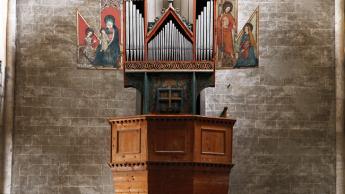
|
| l'Orge de Valere |
The flute is just about the oldest musical instrument if you regard a pipe organ to be essentially a large collection of flutes with a single mechanical air blower, controlled by a console. Bagpipes almost fit that description, too, except a bagpiper first fills the bag with air he blows in by himself, and fingers the holes in the pipes for individual notes, whereas the pipe organist has mechanical assistance to supply the air and control the pipes.
It seems to have been Emperor Charlemagne who decreed the pipe organ would contribute the main music of churches, and to fit this role, pipe organs in France and Italy evolved in the direction of elaborating the overtones and color characteristics of the organ as sort of a soloist in a church. Organs from this distant era are still playable but seem tiny in comparison with later examples. German music, in general, has always emphasized melody over elaborate overtones, and German organs evolved in the direction of distinctive notes in counterpoint. That has been true for centuries, but it was the missionary surgeon Albert Schweitzer who most recently made great steps away from French influences back toward melody and counterpoint, both in musical composition and in mechanical modifications of the instrument to suit that baroque goal. The mechanical underpinning of this distinction lies in the immediacy of response and shortening of tone decay, making the notes crisper. The older French version tends to smear the notes together, like a young person who talks too fast. The whole French language shares that characteristic of slurring words together, and speakers thus seem to be talking a little too fast to be understood. The German language is more staccato, with distinct separate words. In general, pipe organs tend to be either of the French or the German style, but there is a great deal of individual variation, resulting in subtle distinctions lost on most audiences. The design and construction of organs remained essentially unchanged from 1390 when l' Orge de Valere" was published by Guy Bovet, until 1876, when the great modern innovation of the electric organ was displayed in Philadelphia.
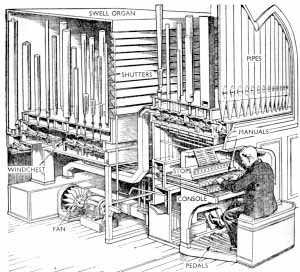
|
| Pipe Organ Sketch |
In fact, two modern changes were heavily American-influenced. The most important change in the mechanics after five hundred years was introduced at the 1876 Centennial Exposition in Philadelphia, by Hilborne L. Roosevelt, a cousin of Teddy, and son of S. Weir Roosevelt. The organ on display was the main organ of the main exposition building and created a sensation. Although he was only 37 years old when he died ten years later, Roosevelt became one of the largest organ manufacturers in America, a friend of Thomas Edison, and was recognized for a number of electrical inventions. Electrical control of the blower and valves greatly expanded the potential for size and complexity of the keyboard console. Up until that time, the keys were pounded with the organist's fists, and organists therefore somewhat resembled blacksmiths, both in musculature and temperament. The application of electricity greatly expanded the complexity and artistic potential of both the German and French styles. Meanwhile, the symphony orchestra was evolving throughout the 19th Century, and now the organ was able to imitate the whole orchestra. This evolution soon developed a mass market in the huge silent movie theaters of the early 20th Century, which in turn generated a pressure to evolve orchestra-like characteristics in the organs installed in the theaters, adding extra pipes and tones to suit that taste, which was exuberant. The advent of sound movies would soon eliminate the need for pipe organs in movie houses, but the instruments were durable and built into the walls. A few of them therefore still remain, largely unused, and probably unusable. The Philadelphia region is unusually rich in pipe organs of various sizes and complexity; students of the subject come here to tour them.
Philadelphia's Kimmel Center has a new pipe organ, with two consoles to suit the two main styles of organ music, solo of the Charlemagne sort, and orchestral music. Wesley feels too much emphasis was placed on maximizing the seating capacity of the Kimmel auditorium, causing the organ to be fitted into a narrow tunnel-like enclosure. The resulting sound of the organ has a uni-directional quality which is unrelated to the organ itself; some people criticize the overall result as "assaulting" the audience, but whether for better or worse the Kimmel Center distinctively has a Kimmel sound.
The electronic organ, as distinguished from the electric organ, doesn't use pipes, it synthesizes sound. It is far cheaper to manufacture, but is undergoing such rapid change in so many directions nowadays that it resembles the home computer; you have to go to the expense of getting a new one every few years. The electronic organ is clearly catching up with the range and quality of pipe organs but has not yet reached parity except in specialized situations. But its rapid and relatively inexpensive adaptability gives it a great advantage when musical tastes are changing. Modern music places much more emphasis on percussion, and modern society is much less attracted to great big hollow churches. Electronic organs thus change direction faster than multimillion dollar organs of the traditional sort, and slowly, slowly, the quality is catching up, too.
There She Goes, Miss America
Atlantic City has long been a summer resort, crowded with people on the boardwalk by the sea. But families suddenly disappear at Labor Day, when the kids go back to school. So, in 1921 the merchant community hit on an idea to extend the busy season an extra week, by having a big beauty contest on the week following Labor Day. The early Miss America contest struggled for a year or two and then became an established annual national ritual. The hotels and boardwalk did indeed stay crowded for an extra week, during which a publicity campaign was conducted to build up anticipation for the big Saturday night event. The preliminaries included interviews and mini contests, for the bathing suit division, the evening gown division, arguments about official state representation, occasional scandalous behavior, parades in open convertible cars, and whatnot and whatnot. Behind the scenes, there were little local battles, including a grim determination not to have a negro girl represent a state from the old Confederacy. Since only one Jewish girl ever won the contest in eighty years, there were probably other issues in other states, hidden behind the curtains. Smoking and drinking were prohibited but scarcely non-existent, as was getting married or pregnant; much of the fuss about these lesser moral issues was probably intended to cloak the event with the high moral tone, counteracting some unfortunate early beginnings of the pageant, and the exciting laxity traditionally associated with summer resorts by the ocean. But they aimed at and succeeded in attracting, a certain kind of audience.
For months before the pageant by the sea, preliminary contests were held throughout various states to select the local Queen, Miss Arizona, Miss Mississippi, Miss Delaware and so on. The people involved in these local contests duly trooped to Atlantic City to see the big event and cheer their candidate. Over time, it became clear that some states worked really hard on this effort; Mississippi was a notorious big spender, and a consistent big winner, but others were almost as determined to win. The grassroots campaign was largely centered on small-town high schools, but the effort was conducted by a great many local women, mostly middle-aged and often quite homely, who somehow got control of local beauty politics and ran the local contests. Over the years, two of these groupies had been nurses who worked in hospitals where I was a consultant, and I got to watch their enthusiasm bubbling under the surface. One woman had worked for years as a night nurse. The sort of person who sleeps all day and works all night tends to be a little odd, often slightly hostile. But when I asked this ancient battle-ax every year about the contest, she immediately blossomed and went on for half an hour about the gossip surrounding this year's contestants and winner. There was something about all this which was like the fantasies of playing with dolls, fulfilling unfulfilled dreams. If you pause to think about it, that enormous convention hall in Atlantic City wasn't filled with school kids after Labor Day; the school kids were back at school. Although the publicity was all about kids and giggles, the real fans were dreaming of days long past, perhaps as former beauties, more often only wannabes, their dreaming only intensified by knowing for a certainty that this success would never be theirs.
It was this self-delusion quality which the promoters of the contest never seemed to get through their heads; after all, the pageant was created and promoted by local merchants who mostly aimed to sell salt-water taffy to the rubes. Radio, and then television, gave the Miss America contest a big publicity push, and then eventually used up its material. When the casino crowd moved into A.C., the non-gambling ladies playing with dolls quickly demonstrated they didn't gamble, in fact, would sass the serious gamblers for their idiotic behavior losing money as fast as they could. TV ratings, contest attendance, and publicity began to fall off rather seriously. The idea was tried that perhaps women now wanted careers, so "points" were awarded for talent shows, musical performances, and brief contests about current events. Foo. That's not what the audiences wanted. So the contest moved to Las Vegas, and the date was shifted to January, a slow time for casinos. The awards were shifted from national tours and opportunities for screen tests to the awarding of college scholarships. Unfortunately, most of the contestants were already in college or married, and the scholarships were in fact mostly used to pay off trailing debts from colleges already attended.
So Miss America, now regularly a black woman but seldom a Jewish one, continue to be fodder for the sponsors and promoters of the pageant. But wherever it goes and whatever its modifications, the Miss America contest is never going to return to former glory until it learns who its real audience is. The lonesome, middle aged lady who dreams of playing dolls with live dolls.
And then, Miss America went away. Some other city has her. Atlantic City lost her. And there she goes, Miss America.
America's New Theater Capital
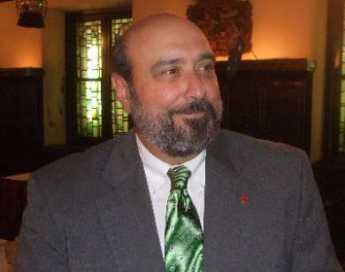
|
| Gene Terruso |
In the Elizabethan era, London experienced a remarkable burst of legitimate theater; Shakespeare was only one part of it. There were fifty-five theaters in London at a time when only two were open in Paris; no one is certain why that happened. Similarly, no one is sure why Philadelphia has decided to have a flourishing theater scene, but if you look around it is true. After 1929, Philadelphia became a "try-out town" for plays hoping to go to New York; we were in a class with New Haven CN and Washington DC. Home-grown talent languishes in competition for audiences who would rather see famous visiting stars. The try-out image is harmful and must disappear before local talent can develop. Once established, however, audiences rather like a theater company with a deep bench; fresh young aspirants at every level, as contrasted with one famous star surrounded by hacks in the lesser roles. The same reaction is seen in minor-league baseball. And no doubt union seniority systems are partly designed to protect the hacks from competing young aspirants. A certain amount of amateurism is forgiven for inexpensive amateurs; when they get expensive it's better to watch movies. The Right Angle Club was pleased to have it all described if not explained by Gene Terruso, the Professor of Drama at the University of the Arts on Broad Street where the old Ritz-Carlton used to be.
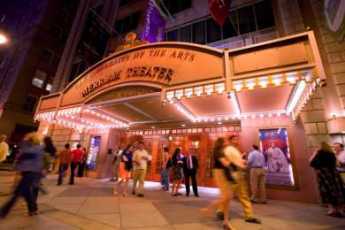
|
| The Merriam Theater |
As far as inside gossip is concerned, the Merriam Theater is owned by the University of the Arts but is sort of doomed to shabby prosperity for the next 13 years by a lease which is too lucrative to modify. That's why the seats are a little uncomfortable, the lobby dilapidated, and comparatively few student productions are on the stage. The University would like to have more student presentations but isn't in a financial position to displace the tenants generating such high revenue. The best that can be made of the present arrangement is to encourage the visiting professionals to mingle with the drama students, bedazzling and advising them how to advance in the Big Time. It's been a fairly successful compromise.
Until recently, Chicago seemed to have the most successful regional theater experience, but now is thought to be on a par with Los Angeles, Seattle, and Cincinnati whereas Philadelphia has supplanted it as the very best place to be. Going backstage, the kids express little interest in going to Broadway, where overpriced theater seems to them to be just part of the tourist industry. Television is regarded as old-fashioned, so Hollywood is unattractive to them, too. If that's all the future holds, these kids would rather become accountants and computer engineers. And stay right here if they can; that seems to be a central motif. Gene Terruso says there is an "Iceland phenomenon" in Philadelphia, a wonderful hidden place to live, so tell everybody else it is cold and dreary and they will stay away and not ruin it.
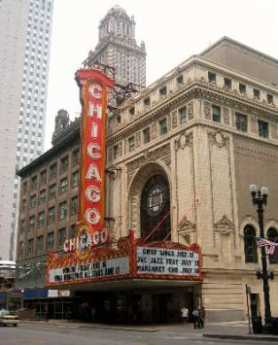
|
| The Chicago Theater |
The fact seems to be that Chicago is seen to have a great many "hole-in-the-wall" theaters, while Philadelphia has well over thirty flourishing theater troupes. The professor in him prompts Gene Terruso to postulate that the secret of our success is for each repertory troupe to specialize in something, get good at it, and bank on the motto Be clear about your mission; the audiences will follow. Therefore, we have Shakespeare companies, musicals companies, Restoration comedy companies, and so on. Some specialties are obviously more popular than others. Somewhere in this business school analysis is the likelihood that artsy craftsy people are seldom very good at running a business, so theater success does depend on non-actors who are business-oriented minding the store, and possibly not much good at acting. It's a lesson many idealists and liberals need to learn, and not just in the theater.
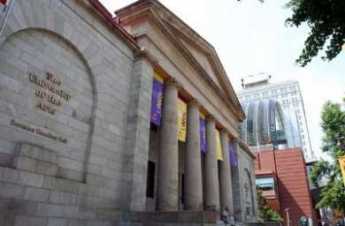
|
| University of the Arts |
Professor Terruso does ruefully admit that the University of the Arts is a conservatory, by which he means a trade school. Its graduates are more likely to know how Hamlet should run a sword through Polonius without killing the other actor than to discuss the place of Shakespeare in our cultural heritage. To have a successful theater, however, there has to be an enthusiastic audience. Somewhere, our universities have found it easier to provide a liberal education to one group of people and impart the tricks of the trade as a specialty of someone else. If the two talents merge at all, it is in the profession of Dramaturge, but all in all, it would be better if both sides of the footlights understood each other somewhat better. Going to the theater really isn't a specialty, and it isn't a secret society, either. That's part of the response to city leaders who greatly desire a thriving theater, but wish we didn't have to see so many of those artist types walking around town. Both groups need to understand "There's plenty of room at the top, but no room at all at the bottom."
Musical Theatre at the 11th Hour
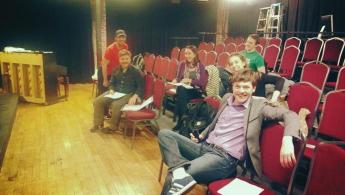
|
| Michael O'Brien |
Philadelphia is having a theatrical revival, very likely leading the cities of America in that regard. One of the central movers and shakers of that movement visited the Right Angle Club recently. Touting his own company, without a doubt, but nevertheless illuminating a movement which seems pretty central to Philadelphia's future. Michael O'Brien is the Producer and Artistic Director of the 11th Hour Theatre Company, which had its origin eight years ago in the Studio of the Walnut Street Theatre, and has since spread out to many venues within Philadelphia. Since Mike O'Brien got his start in theater at the Walnut, it is only fair to say the Walnut Street Theatre was a parent of the 11th Hour. The 11th Hour is a 501(c) (3) nonprofit corporation, so it sort of sounds as though the William Penn Foundation was somewhere in the background, at least at one time.
The 11th Hour Theatre Company is one of 1200 theater companies now active in Philadelphia but is the only company dedicated exclusively to musicals. More finely tuned than that, it specializes in small productions with five or six members of the orchestra, and about the same number of actor/singers on stage. It happens there aren't very many such productions to chose among, so someone must stimulate more composers to pay attention, or the 11th Hour could run out of musicals to produce. Some of this is economic. The kind of big-time musical comedy which makes a gazillion dollars with a huge cast, huge orchestra, huge scenery is very expensive to produce, and probably soon runs out of audience members who are willing to pay huge ticket prices for anything except a huge production success, produced at huge financial risk. For the most part, the national market will only profitably support one or two of those a year, with the consequence that lots of people lose a lot of money on the ones which fail, and most of the successes are rescued by movie and television revenue, which involve further financial risk-taking. Apparently, the successful composers either try to claw their way to the big brass ring or else look for other lines of work. Someone may eventually figure out a way to start with a small musical and then scale it up to the big-time, but what has happened seems to be that actors and musicians who shrug off the big time, cluster together and try to produce a career which prefers a normal sort of home life, to the neurotic struggling which seems inherent in those who consider themselves big-time theatrical material. Somehow, the dictionary definition of the 11th Hour -- the time when most creativity appears -- has instant appeal to the sort of person who prefers to live a normal life within a close circle of like-minded friends and finds that to be a possibility in Philadelphia. We'd like to remind him you can't fill the seats of a theater without an enthusiastic audience, but it's nice to hear our town is a congenial place to live and be an actor.

|
| 11th Hour Theater |
Michael O'Brien regards the theatrical revival of Philadelphia to be part of the restaurant revival of the 1980s. Just as the nightlife of Philadelphia was once centered around coming to town to go to the movies, Mr. O'Brien regards the theater as the centerpiece of an evening in town for a couple who want to come for exotic food, plus some entertainment. We have night clubs and celebrity concerts for the dating set, but a quiet dinner followed by the theater appeals to a different, somewhat older set. Once this movement gets started, performers arrive from out of town and discover they like the sort of life entertainers enjoy here, so they stay. And many graduates of local colleges and universities grow up close enough to the scene that they decide they never want to leave. Naturally, a producer and artistic director has the perspective of the performing community and tends to emphasize the attractiveness of Philadelphia to performers. In addition to that, of course, enough dumb old plain citizens have to be attracted to the theatrical product, in order to provide audiences for 1200 theatrical companies; and novelty alone is not enough to sustain that. Some such mutual need was once provided by the sudden Elizabethan flowering of the theater of London, and five hundred years later no one has completely explained it. But for comparison, in Shakspere's day, there were fifty-nine London theaters at the height of the Elizabethan boom, but only two in Paris.
The Last of the Algonquins

|
| Jon Schau |
The Franklin Inn has trouble fitting fifty people in the audience, but it has a long history of members writing little plays for the special interest of its members. The latest was written by Jonathan Schau about Robert Benchley and Dorothy Parker, just before they went to Hollywood to try out, and received by the members with great merriment. Just in case anyone was still in doubt about the amount of alcohol being consumed in those days just after Repeal of Prohibition, I felt the urge to rise and tell the audience about an autopsy.
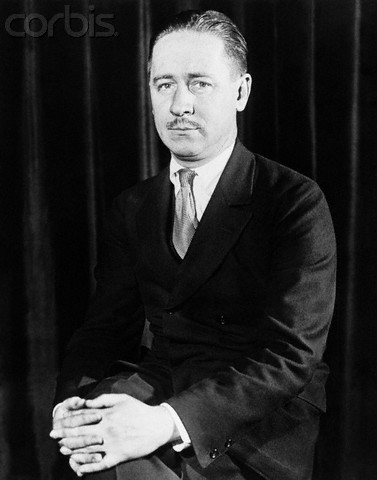
|
| Robert Benchley |
In 1945 I was a sophomore medical student at Columbia's College of Physicians and Surgeons, taking the course in Pathology. With a perfectly straight face, Edith Sproul the professor of pathology introduced us to an autopsy of a case of cirrhosis. The pathology classroom was not very different from the one at the University of Bologna which has been restored in Italy after unnamed pilots bombed the original into smithereens. But the famous painting of the original shows what it looked like, and the reproductions in Bologna and New York are very similar.
Nobody was indiscreet enough to mention it, but the canary-yellow subject on the table looked very much like Robert Benchley, whom the newspapers said had just died in that hospital. In any event, the subject had the worst looking case of cirrhosis of the liver which I ever hope to see. And in describing it I was surrounded by a club audience, every member of which had a glass in his hand. We don't need a cure for cirrhosis, of course. We have a cure for cirrhosis, perhaps a little more in use than it was in 1945, but not necessarily more popular.
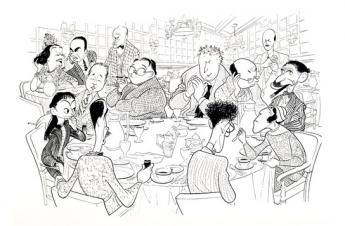
|
| Algonquin Round Table |
While we are on the subject of the Algonquin Round Table, I might as well confess that my father-in-law was an occasional visitor. He wasn't an "official" member of the club, but Alexander Woolcott had been his roommate at college, so he was welcome. Alexander was often, in turn, a visitor at what was my wife's house, and my mother-in-law absolutely detested what she called "a dirty old man", for reasons that were never explained to me. Alexander sprained his ankle while visiting, and it is family lore that the whole episode is central to the play called, "The Man Who Came to Dinner". In fairness to Alexander, I hope the play does as little justice to him, as it did to my mother-in-law.
| Posted by: Bryson | May 1, 2011 7:56 PM |
Locations in Shakespeare's plays.
89 placemarks show almost all the places quoted in Shakespeare's plays.
For each place, the name of the play is noted with the number of the scene of the first appearence of the place.
Some places are in many plays, all are mentioned.
2 places are still missing, do you know where they are ?
The Earl of Gloucester's castle., King Lear : 1, 2
Yorkshire, Gaultree forest, Henry IV, part 2: 4, 1
Posted on Google Earth Community by Member # 177749 "World Explorer" an MD from Lons le Saunier, France with 304 posts to his credit
| Posted by: g4 | Oct 27, 2007 6:48 PM |
15 Blogs
Fanny Kemble
 Frances Anne Kemble had it all: fame, beauty, wealth, personal friendship with real royalty and literary royalty. Beyond that, she caused a major new understanding of Shakespeare and was a major force in the abolition of slavery. Philadelphia wasn't big enough to hold her; perhaps no town was.
Frances Anne Kemble had it all: fame, beauty, wealth, personal friendship with real royalty and literary royalty. Beyond that, she caused a major new understanding of Shakespeare and was a major force in the abolition of slavery. Philadelphia wasn't big enough to hold her; perhaps no town was.
Swashbuckler
Your author is probably the only person still alive who attended the Senate hearing of Howard Hughes. There is probably a lot to this story yet to emerge.
Show Biz Image: Hepburn, Rogers, Kelly
 Hollywood presented a cartoon of the upper class during the Depression. World War II was soon to sober us up.
Hollywood presented a cartoon of the upper class during the Depression. World War II was soon to sober us up.
Falstaff Without Prince Hal
 The parents of W.C. Fields didn't treat him very well, but he always acted as though Philadelphia didn't treat him well. Philadelphia's main crime was probably that it disliked the Volstead Prohibition of Alcohol Act somewhat less than Fields disliked it.
The parents of W.C. Fields didn't treat him very well, but he always acted as though Philadelphia didn't treat him well. Philadelphia's main crime was probably that it disliked the Volstead Prohibition of Alcohol Act somewhat less than Fields disliked it.
Friends of Boyd
 The last movie palace in Philadelphia is either ready for restoration, or the wrecking ball.
The last movie palace in Philadelphia is either ready for restoration, or the wrecking ball.
Valentine Tours, Right Here in River City
 The First Zoo in America specializes in breeding animals that are hard to breed in captivity. The Women's Committee decided to bring this delicate topic out into the light.
The First Zoo in America specializes in breeding animals that are hard to breed in captivity. The Women's Committee decided to bring this delicate topic out into the light.
Neglection
 Shakespeare invented words freely, but unlike the rest of us, he invented good ones.
Shakespeare invented words freely, but unlike the rest of us, he invented good ones.
The Man Behind the Mann
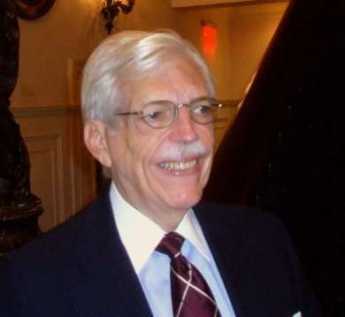
Plays and Players, Haddonfield Version
 This year the Haddonfield Plays and Players celebrate their 75th anniversary, with an outstanding production of Anything Goes, by Cole Porter Y'13.
This year the Haddonfield Plays and Players celebrate their 75th anniversary, with an outstanding production of Anything Goes, by Cole Porter Y'13.
Cushman Club for Lonesome Actresses
 One of the ancient Camac Street clubs has closed its doors, to become a charitable foundation.
One of the ancient Camac Street clubs has closed its doors, to become a charitable foundation.
Pipe Organs, and Similar
 The pipe organ is an astonishingly ancient instrument, usually very expensive and hard to maintain, with many individual variations. The electronic organ is catching up and may surpass the pipe organ in a few decades, but that's guessing.
The pipe organ is an astonishingly ancient instrument, usually very expensive and hard to maintain, with many individual variations. The electronic organ is catching up and may surpass the pipe organ in a few decades, but that's guessing.
There She Goes, Miss America
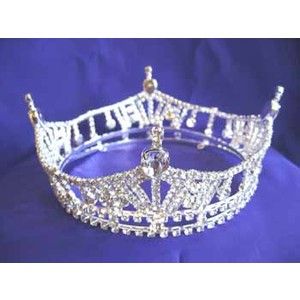 The Miss America contest is all changed and different, but maybe it stays the same.
The Miss America contest is all changed and different, but maybe it stays the same.
America's New Theater Capital
 New York's professional theaters have mostly become a tourist industry. The new capital of legitimate theater in America is -- Philadelphia.
New York's professional theaters have mostly become a tourist industry. The new capital of legitimate theater in America is -- Philadelphia.
Musical Theatre at the 11th Hour
 There are 1200 theatrical companies in Philadelphia, but only one devoted to musicals. Does that say something about the audiences, the unions, or the musicians?
There are 1200 theatrical companies in Philadelphia, but only one devoted to musicals. Does that say something about the audiences, the unions, or the musicians?
The Last of the Algonquins
 Jonathan Schau recently wrote a play for the Franklin Inn about the heyday of the Algonquin Round Table, just before everyone left the New Yorker to try out in Hollywood. Just in case anyone had doubts about the consumption of alcohol, I rose to tell the story of the autopsy of one of the central figures.
Jonathan Schau recently wrote a play for the Franklin Inn about the heyday of the Algonquin Round Table, just before everyone left the New Yorker to try out in Hollywood. Just in case anyone had doubts about the consumption of alcohol, I rose to tell the story of the autopsy of one of the central figures.